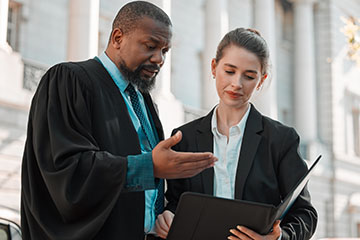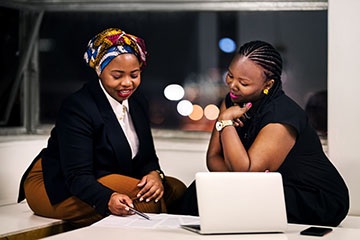 The organisations in South Africa that can help are:
The organisations in South Africa that can help are:
Legal Aid
You can access quality legal services from a Legal Aid office near you.
Who qualifies for Legal Aid?
Any person who lives in South Africa can approach Legal Aid if the case is criminal, or involves children, or involveds asylum seekers. You can get Legal Aid for the following cases:
- Criminal offences
- Consumer issues (Consumer Protection Act)
- Contract law
- Debt issues (National Credit Act)
- Deceased estates
- Equality Court cases (Promotion of Equality and Prevention of Unfair Discrimination Act 4 of 2000. Do note that personal damages claims excluded under the Legal Aid Regulations may not be dealt with as part of an Equality Court action or claim)
- Problems accessing payment of benefits
- Employment claims, such as unfair dismissal or discrimination
- Separation, divorce or disputes about children
- Actions against the police, such as wrongful arrest
- Challenging the decision of a local authority
- Housing, such as threatened eviction
- Threatened evictions from farms
- Mental health, such as legal advice if you’re detained in a mental hospital
- Domestic violence
- Land rights matters
- Any case where your rights have been violated
Civil cases of non-citizens don’t qualify for legal aid. To get legal-aid, you have to pass a means test, proving that you earn less than an amount determined by the Legal Aid Board. The amount is reviewed every year where the following is considered:
- If you own a home.
The total value of the house and all your belongings mustn’t be worth more than R665 800. You must only have 1 house and you must live in it.
- If you don't own a home.
The total value of all your belongings (for example, your car, furniture, clothes and other personal things) mustn’t be worth more than R141 900.
- If you’re employed
You must earn less than R7,700.00 per month after tax has been taken off.
- If you’re receiving a state grant
You’ll have to take the means test, and you’ll need to show official documentation that you’re receiving a state grant or pension.
- If you’re elderly.
You don’t have to take the means test, and you’ll need to present documentation that you’re receiving a state grant or pension.
- If you’re a child.
In criminal cases, children automatically qualify for Legal Aid and don’t have to take the means test. If it’s a civil case, the family of the child will need to take and pass the means test.
You don’t pay for legal aid
If you qualify for legal aid, and Legal Aid SA agrees to represent you, the service will be completely free, and you won’t be held responsible for any fees.
If you win a civil case, they will deduct the money that the court grants to pay for costs and benefits, before they pay the money owing to you.
Note: Legal Aid South Africa lawyers may not ask for payment or be paid, when they assist you with your case. If this does happen, please report the lawyer to Legal Aid SA by calling their Ethics Hotline on 0800 153 728, or visiting their website or going to their offices.
If you need more information or advice, please contact your nearest Legal Aid Board Offices (also called Justice Centres), or one of the following legal aid clinics:
Pro bono (free) attorney
There are attorney’s and law firms that offer free legal help to people who have a legal problem that holds merit. A means test will be done to see if you qualify for the assistance of a pro bono attorney.
Where can I get access to a pro bono attorney?
You can access the
Legal Practice Council website and find out how to lodge a complaint and download the application form.
You can also contact the following organisations for assistance by a pro bono attorney:
ProBono.Org:
They facilitate the provision of free legal services for the poor by volunteer private lawyers.
For more information contact:
Address: Unit 1021, 2nd Floor, Westminster House, 122 Longmarket Street (Cnr. Adderley St.), Cape Town 8001
Tel: 087 470 0721
Fax: 086 665 6740
Email: infocpt@probono.org.za
South African Society for Labour Law:
They deliver a quality advisory service and limited Labour law legal services to those who don’t have access to justice.
For more information contact:
Fatima Rustin
Email: westerncape@saslaw.org.za
Operating hours: Cape Town: 09:00 to 14:00 Friday
 Free legal advice
Free legal advice
Family Law Clinic:
They’re an NGO that offers free legal advice in matters relating to family law. They help families in matters relating to domestic issues such as:
- Domestic violence
- Child abuse
- Abuse of the aged
- Maintenance issues
- Marital conflict
- Guardianship
- Adoption
They will also help with any other areas of family conflict requiring counselling and/or legal resolution.
For more information contact:
Family law clinics:
Address: 3 Griselda Close, Somerset West
Tel: 021 851 5504
Fax: 021 851 7506
Email: info@familylawclinic.org.za
Women’s Legal Centre:
It’s a non-profit law centre that provides free legal advice and legal support to advocacy campaigns run by other organisations.
For more information contact:
Cape Town Office
Address: 2nd Floor, 5 St Georges, St Georges Mall, Cape Town
Tel: 021 424 5660
Media queries: communications@wlce.co.za
Helpdesk queries: info@wlce.co.za
Lawyers for Human Rights:
It provides free legal services to vulnerable, marginalised and indigent individuals and communities, both non-national and South African, who are victims of unlawful infringements of their constitutional rights.
For more information contact:
Tel: 012 320 2943
Email: info@lhr.org.za

 The organisations in South Africa that can help are:
The organisations in South Africa that can help are: Free legal advice
Free legal advice
